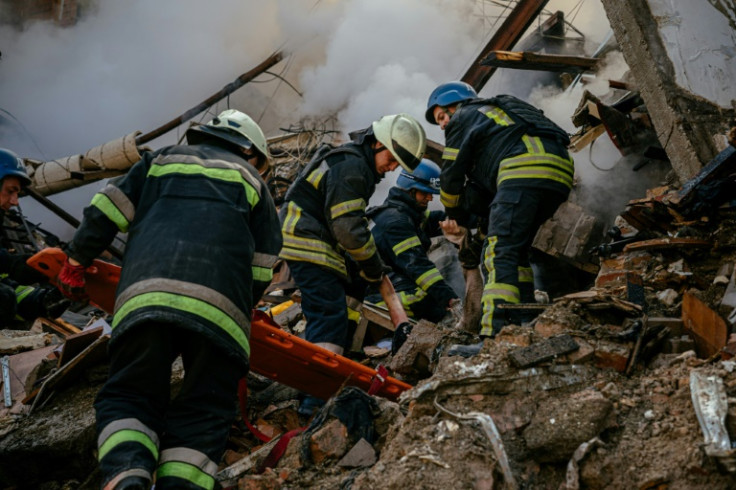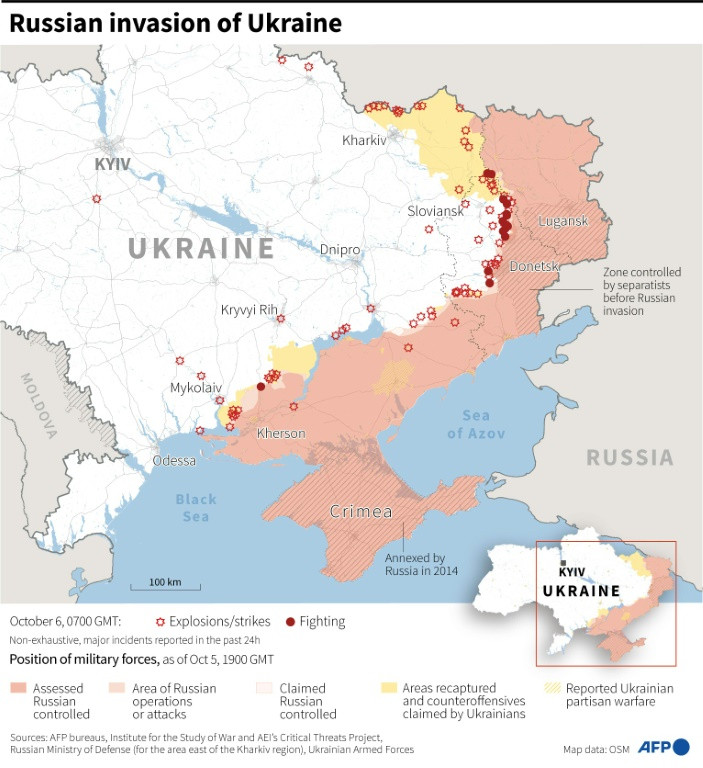Ukraine Says Recaptured Vast Tracts Of Key Kherson Region

Ukraine said Thursday that it had wrested Russian troops out from swathes of the southern Kherson region, pushing a counter-offensive that has undermined the Kremlin's claim to have annexed the territories.
The announcement came after a barrage of devastating Russian bombardments of the city of Zaporizhzhia that left several civilians dead in an attack Kyiv said was a deliberate attempt to "sow fear" among the population.
Ukraine's military has not only said it was reclaiming territory in the south, but also in the eastern Lugansk and Donetsk regions, that have been partially controled by Kremlin proxy forces since 2014.
"The Armed Forces of Ukraine have liberated more than 400 square kilometres of the Kherson region since the beginning of October," Ukrainian southern army command spokeswoman Natalia Gumeniuk said in a briefing online.
She later added that the recaptured territory was home to nearly 30 towns and villages that had been occupied by Russian forces for months.
Kherson, a region with an estimated pre-war population of around one million people, was captured early and easily by Moscow's troops after their invasion launched February 24.
Russian-installed officials have renewed a call for residents to remain calm, with deputy pro-Moscow leader Kirill Stremousov saying Kremlin forces were holding back the advance.
"At this stage, nothing has changed and there is no panic," he said in a video-statement to residents.
Ukrainian forces have in particular made gains on the west bank of the river Dnieper that cuts through Kherson, but the Russian military in a briefing said Thursday that its forces rebuffed "repeated attempts to break through our defences" in the area.
Further west, on Ukraine's contact line with Russian forces from the Mykolaiv region -- where Kyiv's forces had been hunched in fox holes for months and pounded by Russian artillery -- the mood was shifting along with frontlines.
Bogdan, 29, from northwest Ukraine re-enlisted in the military this year and has spent most of the summer holding the line some four kilometres (2.5 miles) from the dug-in positions of Moscow's forces.
"We see that our comrades, our 'horde' as we call them, are working. We see their successes and it inspires us. If some thought before that we weren't moving fast enough, well now that's not the case!" he said.
"There is light at the end of the tunnel," said commander Yaroslav, a sturdy 39-year-old man wearing a black cap.
The Ukrainian push deeper into Kherson is putting further strain on the Kremlin's announcement last week that it had annexed the territory -- alongside three others -- and that its residents were would Russian "forever".
The four territories -- Donetsk, Kherson, Lugansk and Zaporizhzhia -- create a land corridor between Russia and the Crimean peninsula, which was annexed by Moscow in 2014.
Together, the five regions make up around 20 percent of Ukraine.
Russia hit back against Ukraine with strikes that battered the central city of Zaporizhzhia in fatal attacks that tore through high-rise buildings and left a toddler injured.
AFP journalists on the scene saw rescue workers in helmets clearing mounds of rubble with their hands, searching for people trapped beneath the debris.
And firefighters were working to extinguish a blaze from a collapsed section of a building with pieces of jagged metal protruding.
Foreign Minister Dmytro Kuleba said after the strikes that left three people dead that Moscow's forces "keep deliberately striking civilians to sow fear".
The overnight attacks follow gruesome shelling last week that Ukrainian officials said killed 30 people after a convoy of civilian cars in the Zaporizhzhia region.
In addition, the presidency said Thursday morning that over the past day 14 people were killed in attacks in the Donetsk region.
The UN nuclear agency chief was due in Kyiv Thursday to discuss creating a security zone around Ukraine's Zaporizhzhia atomic plant -- the largest in Europe -- after Russian President Vladimir Putin ordered his government to take it over.

© Copyright AFP 2024. All rights reserved.







